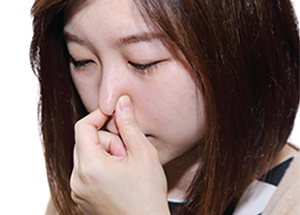You can follow these steps to help your child to stop his or her Nose Bleed at home:
Lean forward and spit out any blood
Sit your child upright in a comfortable position and lean forward so that he or she does not swallow the blood. Prepare a basin for your child to spit out any blood that has dripped from the nose into his or her mouth. Swallowed blood irritates the stomach and may cause your child to vomit it out. Do not be alarmed if it happens.

Pinch the soft part of the nose
Tightly pinch the soft part of the nose, just above the nostrils, for 10 minutes. The nostrils should be closed firmly. Do not release the pressure to check for bleeding until the 10 minutes is up. During this time, your child will have to breathe through his or her mouth.
If bleeding continues, see a doctor
If the bleeding persists, please see your doctor. Continue applying pressure to the soft part of the nose in the meantime.
















